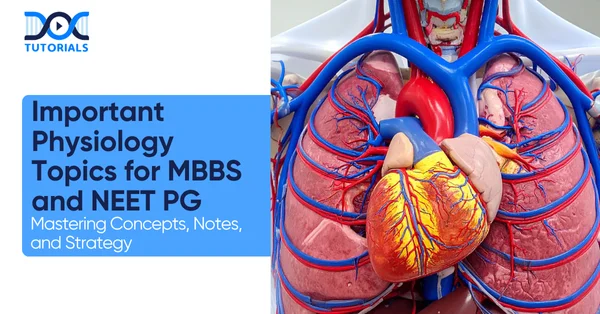Important Physiology Topics for MBBS and NEET PG: Mastering Concepts, Notes, and Strategy

Physiology is the bridge between basic science and clinical medicine, explaining how every cell, organ, and system works to sustain life. Learning it in the first year of MBBS establishes the foundations of comprehending both health and disease.
To NEET PG candidates, physiology is crucial for a proper understanding of concepts and is a boost to problem-solving abilities. This study guide includes the most significant physiology subjects, effective study strategies, and tips on how to make notes to pass the exams.
Keep reading for a detailed insight.
Introduction to Physiology in MBBS
Physiology is commonly referred to as the language of medicine since it explains how each cell and organ functions in a healthy body. It is also taught through experiments that reinforce the concepts in lecture.
Always remember to ask why and how, not just memorise facts. This combined style of study, connecting theory and real-life examples, helps to make the study of physiology a better and easier form of study and the examination questions easier to answer.
Aligning with the NMC Curriculum and NEET-PG Syllabus
The National Medical Commission (NMC) Competency-Based curriculum specifies the skills and subjects that students need to acquire in the field of physiology. There are approximately 136 competencies in 12 topics in the first year. Check the NMC competency list: following each lecture, record what competency was discussed and prepare questions on that competency.
Physiology takes about a third of preclinical examination in most MBBS courses, and therefore, it is vital to invest some time in it. The NEET-PG curriculum is comparable to the MBBS degree in physiology. Physiology accounts for approximately 17 marks in NEET-PG (about 89% of the total) in accordance with the official guidelines.
Plan your schedule accordingly: once you finish a system in class, immediately practice NEET-PG–style questions on that topic. This aligned study saves time and strengthens learning.
Core Physiology Topics for MBBS (System-wise)
There are high-yield topics in each of the organ systems which are common in MBBS exams. The following highlights the most important areas of systems, which constitute a full first-year syllabus:
1. General Physiology
- Basic cell physiology
- Membrane transport (Na⁺/K⁺ pumps, channels)
- Resting membrane potential
- Body fluid compartments
- Homeostatic control loops
- Feedback mechanisms
2. Haematology (Blood)
- Blood composition, blood functions
- Plasma protein, blood formation, haemoglobin breakdown
- Homeostasis in blood cell counts and anaemia
- Blood groups and transfusion
- Coagulation processes and haemorrhage
3. Nerve & Muscle Physiology
- Classification of nerve fibres
- Generation and propagation of action potentials
- Synaptic transmission and reflexes; neuromuscular junction
- Skeletal muscle contraction (sliding filament theory, cross-breathing cycle) motor units
- Smooth muscle contraction
4. Cardiovascular Physiology
- Heart structure as a pump
- Cardiac cycle phases and corresponding pressure-volume change
- Electrical conduction system (SA/AV nodes, Purkinje fibres) and ECG basics
- Cardiac output and its regulation
- Blood pressure control mechanisms (baroreceptors, neural/hormonal)
- Basic hemodynamics (Poiseuille’s law)
5. Respiratory Physiology
- The volume and capacities of the lungs
- Ventilation (inspiration/expiration, lung compliance)
- Gas exchange and diffusion; oxygen-haemoglobin dissociation curve
- Transport of O₂ and CO₂ in blood
- Ventilation perfusion match; breathing regulation (neural/chemical).
6. Gastrointestinal (GI) Physiology
- Digestive tract organisation; motility (peristalsis, migrating motor complex)
- Secretions of saliva, stomach, pancreas, and bile
- Liver function and bile flow; intestinal absorption of nutrients
- GI hormones (gastrin, secretin, etc.)
- Neural and hormonal regulation of digestion.
7. Renal Physiology
- The structure of the kidneys and types of nephrons
- Glomerular filtration (GFR) and its determinants
- Reabsorption and secretion of salt, water, and glucose through the tubules
- Counter-current urine concentration
- Acid-base regulation (HCO₃⁻, H⁺ handling)
- Micturition (bladder and neural regulation).
8. Endocrine & Reproductive
- Major endocrine glands and hormones (pituitary, thyroid, adrenal, pancreatic, calcium-regulating hormones)
- Feedback control of hormone release
- The basic reproductive physiology (menstrual cycle, pregnancy, lactation, male and female hormone actions).
- A basic level is also introduced to special senses (sight, hearing).
You should make notes based on these topics, and learn how things work (e.g. why the heart sounds happen, how a mismatch between ventilation and perfusion leads to hypoxemia). Good notes are never too lengthy, and they focus on the concepts and formulas of high yield.
For example, summarise sequencing (stimulus/receptor) in the form of basic flowcharts, and a specific list of critical normal values (e.g. vital capacity, cardiac output) so that they can be recalled quickly.
High-Yield Physiology Topics for NEET PG
Many MBBS physiology topics remain crucial for the NEET PG exam, often in more depth or applied to clinical scenarios. Physiology is commonly referred to as the heartbeat of the NEET exam in its syllabus, as it incorporates medicine, pharmacology, and pathology.
Approximately 15 questions in NEET PG belong to physiology. Key areas of interest to achieve excellence are listed as the core systems below:
- Respiratory System: Highlight the same fundamental mechanics and gaseous transport as above, focus on special conditions (e.g. high altitude, diving physiology, types of hypoxia). Know some clinical concepts like oxygen therapy and ventilation-perfusion (V/Q) defects.
- Cardiovascular (CVS): Along with cardiac cycle and ECG practice, interpretations of ECG tracings. Understand the ionic mechanism of action potentials in the heart, ARRF, and significant pathophysiology (e.g. heart blocks).
Learn preload, afterload, and Frank-Starling law on one hand and pressure-volume (PV) loops and their variation on diseased valves.
- Renal System: Focus on GFR regulation, renal clearance concepts, and tubular transport of Na⁺, K⁺, and glucose. Master counter-current multiplication and the effects of diuretics on renal physiology. Examine acid-base disorders (respiratory vs metabolic acidosis/alkalosis) and kidney compensations.
- Neuro-Muscular & Nervous System: Include neurophysiology (synapses, neurotransmitters, sensory pathways, reflex arcs) and special senses (visual pathways, auditory physiology).
In innervated-physical-muscular physiology, such topics as neuromuscular blockers, muscle fatigue, and proprioceptors are highly relevant. Know plain neural circuits and clinical reflexes.
- Endocrine System: Know hormone synthesis and action mechanisms. Study key regulatory axes: HPA (cortisol), thyroid (TSH–thyroxine), insulin/glucagon (glucose homeostasis), calcium (PTH, vitamin D). Reproductive physiology (fertility treatments, contraceptives) can also be tested.
- General and Integrated Physiology: NEET PG commonly examines the blended learning concepts like exercise physiology (cardio-respiratory system during exercise), acid-base balance in pathology, and neural-hormonal systems interactions.
As an example, learn to understand the combined effect of hypovolemia (low blood volume) on the heart rate and kidney fight. Subjects such as circulation shock types, stress response, and questions related to homeostasis are common.
- Haematology: Students must understand blood counts in disease (anaemia, polycythemia), oxygen delivery (2, 3 BPG effect with haemoglobin), and the basics of the immune system. Coagulation pathways and coagulation inhibitors (e.g. anticoagulant drugs) are also presented.
- Gastrointestinal Concepts: Deepen concepts of secretion and motility. Examples of high-yield areas are GI hormones (e.g. gastrin in peptic ulcer disease) and malabsorption syndromes (e.g. vitamin B12 deficiency influences intrinsic factor and absorption).
- Reproductive Physiology: Regulation of the menstrual cycle in detail, pathophysiology (e.g. PCOS, menopause), and pregnancy endocrinology. The standard topics include fertilisation and parturition mechanisms.
Effective Note-Taking for Physiology
Revision is more efficient with well-organised notes. Consider these approaches:
- Cornell Method: Break up every page into note taking, cue and summary. Write brief notes in the middle, list important words or questions on the cue column, and write a summary at the bottom.
Such a structure allows quick and convenient review afterwards.
- Mind Maps & Flowcharts: Create illustrations of concepts that are related to each other. As an example, draw a Renin-Angiotensin-Aldosterone system or an insulin/glucagon control flow-chart. The use of visual maps facilitates the combination of information on the topics.
- Tables or Comparison Charts: Create two side-by-side tables in order to compare matched topics. These graphs are excellent, quick-reviewing tools.
- Annotated Diagrams: Do drawings of significant structures (e.g. nephron, chambers of the heart) and processes (e.g. cardiac cycle diagram, ECG waveform).
Write label parts and note values on your drawings. Being physically engaged in drawing cements is much more effective than reading.
- Flashcards or Apps: Formulas, pathways, and values (Henderson-Hasselbalch, normal pH, etc.) should be studied using flashcards (paper or some apps). Regularly test yourself on these cards for spaced repetition.
- Mnemonic Devices: Make acronyms or rhyme lists and sequences (such as a mnemonic to the cranial nerves or the general phases of the menstrual cycle). Memorisation can be made easy with personalised mnemonics.
- Audio Review: In case lectures have been recorded, repeat them to understand complicated issues and address any blank spots. Reinforcing the material by hearing it twice helps in retention.
- Recall Practice: Close and look at your books after studying and attempt to remember key points. E.g., recreate or describe something without notes on a diagram or concept. Such active recall illustrates areas of weakness.
- Review and Summarise: Once you finish a topic, write a brief summary of what you have learned using your own words. Asking yourself questions (as your own examiner) makes you understand more.
With such techniques, you transform boring lecture material into a review-friendly format. Just as an example, Cornell layout or concept maps provide you with a ready-made study outline that you can revise in a short period of time.
Completing the Physiology Syllabus: Study Strategies
It will take planning and dedication to cover the entire physiology syllabus. Here are key strategies:
- Create a Study Schedule: Break down the syllabus in terms of the organ system or subject. Spend June-July on cardiovascular/respiratory physiology, August on renal/acid-base, September on GI/endocrine, and use October on neuro/special senses.
Have specific objectives (e.g. finish cardiac cycle and ECG by Friday) and follow them. A finishing schedule makes you responsible.
- Active Learning: Don’t just read; practice. If a concept (e.g., cardiac action potential) has been studied, then do a related problem or explain it aloud immediately. Writing formulas (like clearance = UV/P) and reasoning through them cements understanding.
- Integrate MBBS and NEET-PG Preparation: Once you have discussed a particular subject in the classroom, change to NEET-PG-style questions on the same subject. This indicates the clinical testing of basic physiology.
As an example, having studied renal physiology, answer questions on acid-base disorders or the influence of diuretics on the practice.
- Spaced Repetition: Arrange several performance reviews. Or, as an example, look through a chapter, a week, and a month later. Over time, reinforcement of important points would be done with flash cards or quick quizzes.
- Interlink Subjects: Connect physiology to biochemistry and anatomy. As an example, study the physiology and anatomy of the kidneys together, or biochemistry pathways (such as the Cori cycle) applied to liver physiology. This interconnection makes understanding advanced.
- Solve Past Questions: Regularly do the NEET-PG question papers. Categorise high-yield locations (acid-base issues, ECG/EEG interpretation, exercise physiology) that emerge. Answer analysis will help you understand what examiners expect.
- Mock Tests: Test on various subjects periodically by taking timed tests. This develops stamina in examinations and points out deficient areas which require additional study.
- Periodic Revision: Include regular revision sessions. An example is reviewing the topics of the week every weekend and going through older chapters once a month. These sessions can be made more effective with the help of mini-quizzes or group discussions.
- Study Environment: Choose a calm and orderly setting with no distractions. Limit the study blocks (e.g. 45 to 60 minutes) separated by short rests. Concentration and retention are enhanced in a good environment.
The synthesis of systematic coverage of topics, active memory, and practice will put a stop to last-minute cramming. It is important to plan one month at a time and test yourself often to guarantee that nothing is missed.
Top Study Resources and Textbooks
High-quality materials and practice tools will strengthen your preparation:
- Standard Textbooks: Don’t neglect detailed texts. Guyton and Hall’s Medical Physiology (Textbook) and Ganong’s Medical Physiology Review provide detailed explanations of the concepts. Read them in order to explore any topic.
- Review Books: To revise quickly, take review guides such as BRS Physiology, A.K. Jain’s Physiology, or MTG physiology handbooks. They highlight high-yield points and often include practice questions.
- Online Lectures: Complex issues can be explained by video tutorials. Explanations can be visualised, e.g., renal countercurrent multiplication, ventilation of the lungs (including visual explanations by some platforms and educators such as Dr Najeeb and Dr Gunjan Wardha).
Reading and then watching a topic may help to better understand.
- MCQ Banks: Consistent question practice is crucial. Use NEET-PG physiology question banks and thoroughly review explanations for both right and wrong answers. This shows how concepts apply to questions.
- Digital Tools: Use apps for flashcards on physiology (formulas, reflexes, normal values). Spaced-repetition apps quiz you on tough points until you master them.
- Class Notes and NMC Guidelines: Your lecture notes, structured by NMC competencies, are your primary guide. After studying each topic, cross-check with the CBME syllabus to ensure you covered every competency.
- Supplementary Videos: Free resources offer good physiology overviews. Sometimes a different teaching style or animation can make a complex idea click.
- Peer Resources: Study groups and shared notes can be valuable. Discussing problems with classmates often brings new mnemonics or explanations to light.
- Online Courses: If you prefer structured guidance, consider online courses or coaching with a focus on physiology. They often provide summarised notes and mock tests aligned with exams.
Recommended books specifically include A.K. Jain’s Textbook of Physiology, Debasis Pramanik’s Principles of Physiology, Guyton & Hall’s Medical Physiology, and BRS Physiology. Use these along with active-learning resources to build a rock-solid foundation.
FAQS about Important Topics for Physiology in MBBS
1. How should I organise my study plan and revision schedule for physiology effectively?
You may split the syllabus into manageable units, as general physiology, after which you proceed system by system. Taking 2 to 3 weeks of general physiology, and 1 to 2 weeks per system, with the final stage to be revision and mock tests.
Follow a set routine: understand, take notes, visualise, and solve MCQs. Keep a checklist or planner to stay on schedule and connect theory to lab work, making it easier to understand and remember.
2. Which physiology topics are most important for NEET PG and MBBS first year?
Prioritise high-yield areas often asked in exams:
- General Physiology: Body fluids, membrane transport, and feedback systems.
- Nerve & Muscle: Muscle contraction, NMJ, nerve fibre types.
- Cardiovascular: Cardiac cycle, ECG, BP regulation.
- Respiratory: Breathing mechanics, gas exchange, control of respiration.
- Renal System: GFR, urine formation, acid-base balance.
- Endocrine & Reproductive System: Hormones, feedback loops, major glands.
Focusing on these ensures strong conceptual and exam readiness.
3. What are the best note-taking and visual tools for physiology?
Use flowcharts for processes, tables for comparisons, mind maps for linking ideas, and flashcards for quick recall. Handwritten notes encourage better engagement and retention. Mix these tools according to your study style to make revisions faster and more effectively.
4. How do I manage tough topics like renal, endocrine, and neurophysiology in a limited time?
Start with must-know subtopics like GFR, counter-current mechanism, and ANS pathways. Break content into smaller chunks and visualise it with diagrams or tables.
Solve MCQs right after studying and relate concepts to clinical cases for better recall. Reinforce learning through spaced repetition, review after 1 day, 1 week, and 1 month.
5. How much time should I spend on daily review versus new topics?
Keep a 60:40 split; 60% on new material, 40% on review. Even 10 to 15 minutes of daily revision improves memory retention. Closer to exams, reverse the ratio to focus more on revision and mock tests. Consistent review prevents last-minute stress and enhances long-term recall.
Conclusion
Mastering physiology is crucial for your 1st year in MBBS. Think long term: the basic knowledge you will have completed in the course of the first year is what will connect all your subsequent courses in medicine, surgery and so on. Through steady practice and the appropriate means, you will be all set to take up university exams.
For further guidance, DocTutorials can be your study partner. Our ‘Physiology Simplified’ and ‘MBBS 1st Year Simplified’ courses offer you complete syllabus coverage with animated video lectures, structured mentorship, and complimentary hardcopy notes. We ensure students are ready and well-prepared from the get-go, helping unlock their true academic potential.
Join DocTutorials today and explore our MBBS course to excel in your medical career!
Latest Blogs
-

INI CET Exam Pattern 2025: A Complete Guide with Subject-Wise Weightage
The Institute of National Importance Combined Entrance Test (INI CET) is your key to entering some of the most prestigious…
-

NEET PG Registration 2025: An Essential Guide For Exam Prep
The NEET PG registration, which is conducted online, is a crucial step in the exam process. Filling out the NEET…
-

NEET PG Syllabus 2026: A Must-Have Complete Guide for Exam Success
The NEET PG Syllabus acts as one of the foundation stones for aspiring postgraduate medical students like you who are…




